Key takeaways:
- Tailoring applications to align with specific company cultures and job requirements is crucial for standing out in STEM job applications.
- Gaining real-world experience through student employment significantly enhances resumes and prepares candidates for interviews.
- Networking and seeking insider information can provide valuable insights that improve application effectiveness and confidence.
- Viewing rejections as opportunities for growth and feedback can redirect efforts towards more fulfilling career paths.
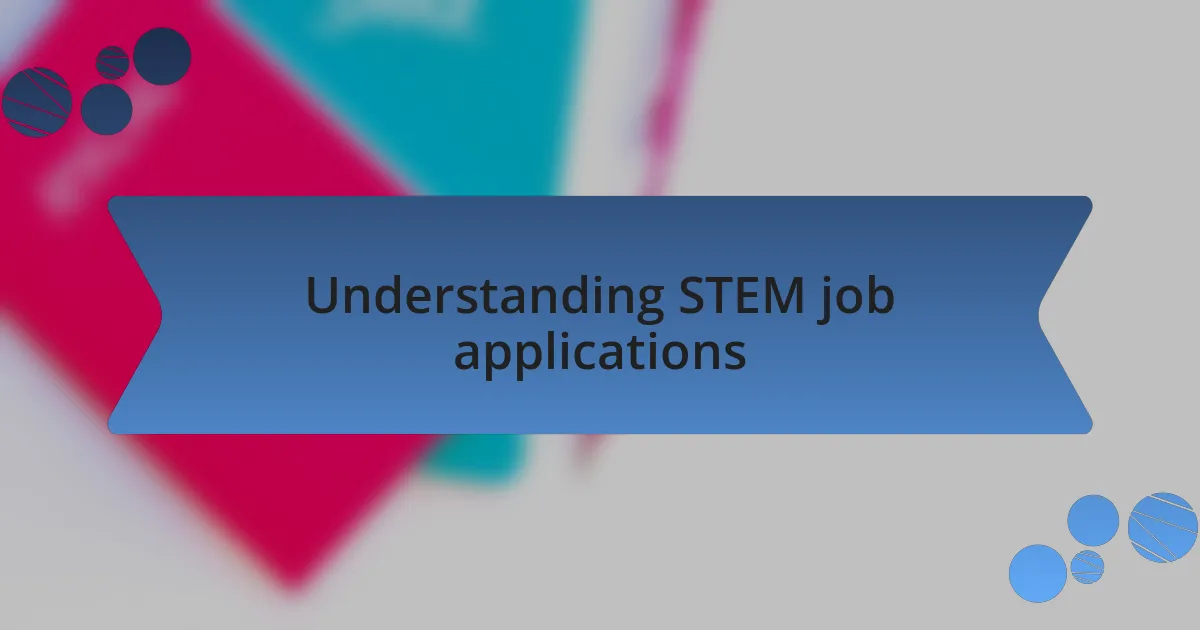
Understanding STEM job applications
Navigating the world of STEM job applications can often feel overwhelming, especially with the specific requirements that each field demands. I remember sifting through countless job descriptions, trying to pinpoint the skills needed for software engineering roles versus data analysis positions. It made me wonder: how does one even begin to tailor their application effectively?
When I finally refined my resume to highlight relevant projects and coursework, it struck me just how different each application process could be. For instance, some companies leaned heavily on technical skills and assessments, while others prioritized teamwork and innovation in their application materials. This realization prompted me to invest time in understanding the company culture—did they value collaboration? Were they looking for independent thinkers? It’s a crucial piece of the puzzle that can truly set your application apart.
Additionally, I found that networking played an essential role in demystifying the application process. Attending career fairs helped me connect with recruiters personally, allowing me to ask questions I hadn’t considered before. How many times have you wished for insider knowledge during an application? I did, and those interactions shed light on what they sought beyond the qualifications listed on paper—real-life insights that made me feel more prepared and confident.
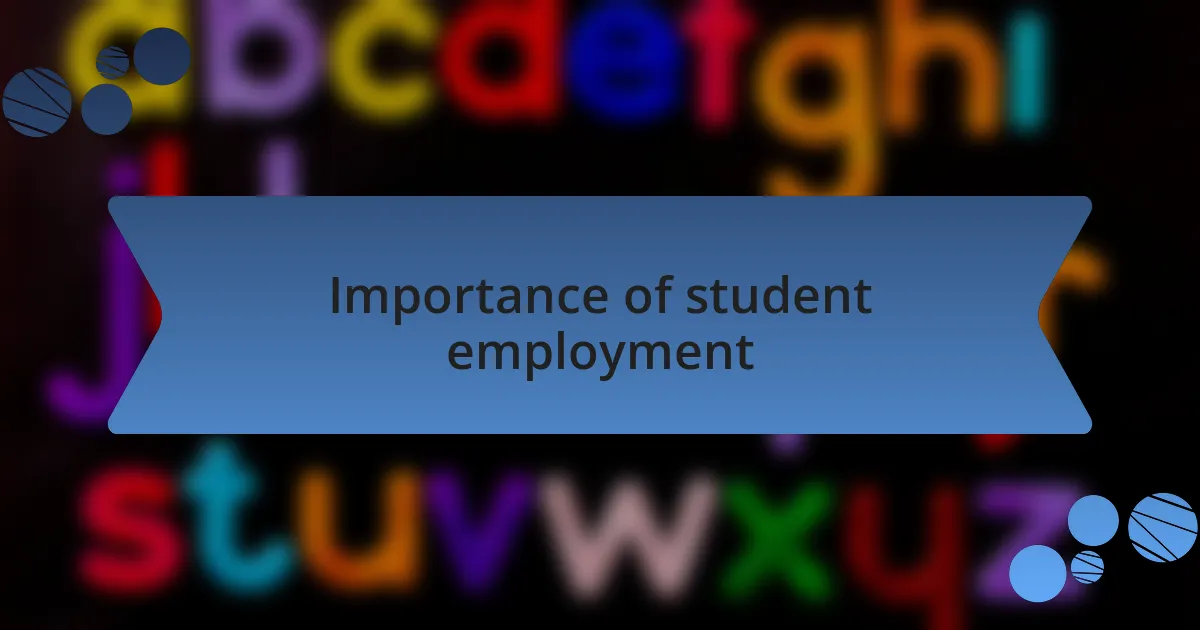
Importance of student employment
Employment during school plays a pivotal role in shaping a student’s future. From my experience, having a part-time job not only provided essential income but also enriched my understanding of real-world applications of my studies. It became a space where I could experiment with theories learned in class, making the academic content more tangible and relevant.
In the competitive landscape of STEM, gaining work experience bolsters a student’s resume. I recall a summer internship where I collaborated on projects that aligned perfectly with my coursework, and it significantly boosted my confidence during interviews. I kept thinking, how often does one get the chance to apply classroom knowledge in a real-world setting? The blend of theory and practice is a compelling narrative that employers appreciate.
Moreover, student employment fosters essential skills beyond academics, such as time management and communication. I vividly recall juggling my studies with a job, which taught me to prioritize effectively. Have you ever felt overwhelmed balancing different responsibilities? It pushed me to cultivate a strong work ethic and enhanced my ability to collaborate with others—qualities that I discovered employers deeply value.
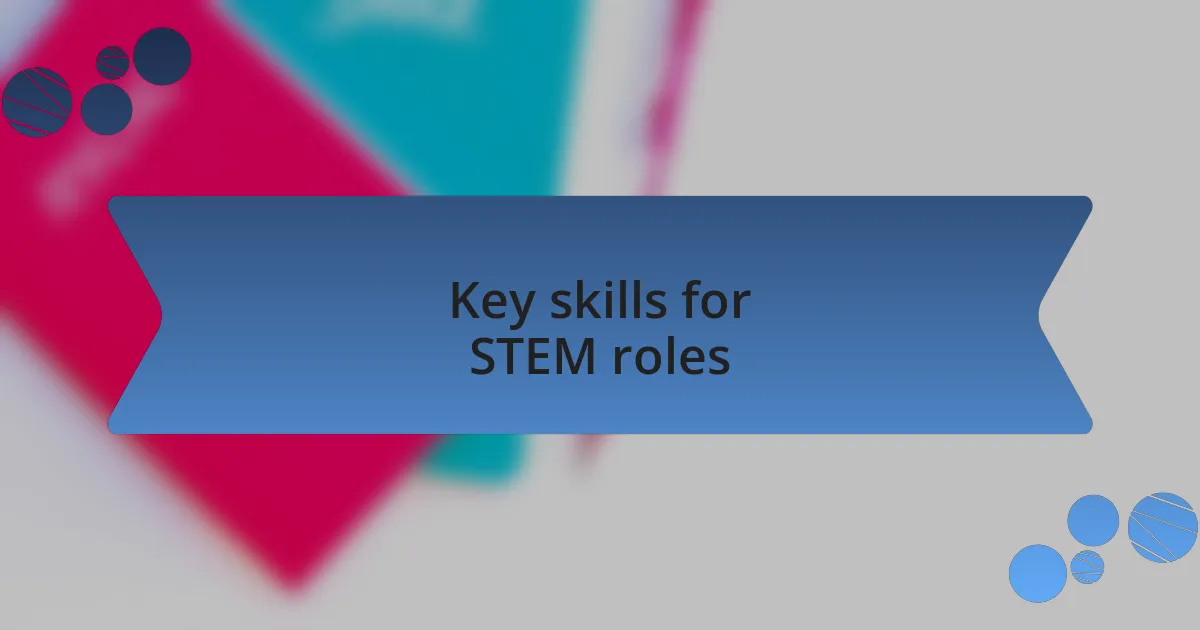
Key skills for STEM roles
Key skills for STEM roles are often a blend of technical expertise and soft skills. From my journey, I learned that problem-solving is a fundamental skill in these fields. During my first coding project, I found myself wrestling with bugs that seemed insurmountable. At that moment, I realized that instead of panicking, I needed to analyze the problem methodically, breaking it down into smaller components. This approach not only helped me fix the issue but also taught me how crucial resilience is in a STEM environment.
Communication plays an equally vital role, and it’s something I had to actively develop. While working on a team project for a class presentation, I discovered that conveying complex ideas in a simple manner was essential for everyone to stay on the same page. Have you ever struggled to explain a technical concept to someone outside your field? I certainly did. This experience highlighted the importance of adapting my communication style to suit my audience—something employers look for in candidates.
Furthermore, I believe that continuous learning is a key skill that cannot be overlooked. I remember attending workshops outside of my curriculum, which not only deepened my understanding but also kept my curiosity alive. Each new skill I acquired built my confidence and prepared me for unexpected challenges in my internships. Isn’t it exciting to think that every new piece of knowledge can unlock future opportunities?
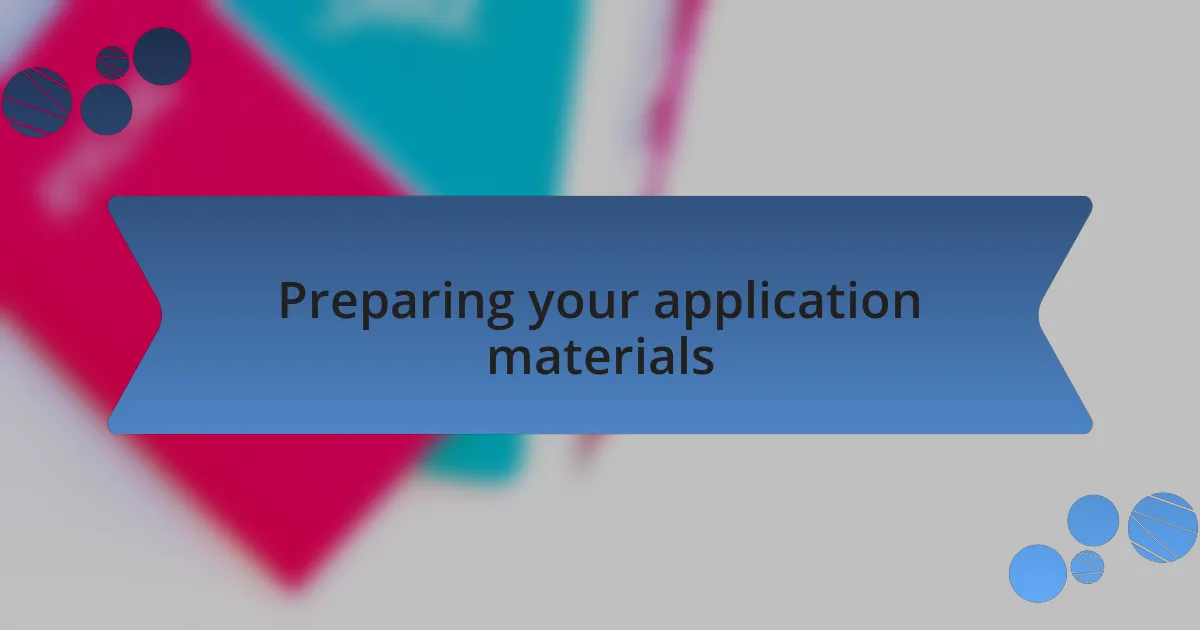
Preparing your application materials
When preparing your application materials, one of the most important aspects is crafting a tailored resume. I recall dedicating hours to tweak mine for a specific internship, ensuring that every line reflected the skills and experiences relevant to the role. This meticulous attention to detail not only made my application stand out but also reinforced what I had learned about the value of showcasing relevant experiences effectively.
Cover letters are another crucial piece of the puzzle. I remember sitting in a coffee shop, wrestling with how to express my passion for STEM while keeping it professional. It occurred to me that sharing my personal journey—the very projects that sparked my interest in the field—made my letter more authentic. What story do you want to tell? This is your chance to connect with prospective employers on a personal level, so don’t shy away from showing your enthusiasm.
Finally, preparing for a technical interview often requires a different kind of preparation. During my first round of coding interviews, I discovered the importance of practicing coding challenges and explaining my thought process aloud. Have you ever faced a tricky problem and struggled to articulate your solution? I certainly have, which is why I started practicing mock interviews with friends. It helped me build confidence and communicate better under pressure, which is vital when you want to showcase your technical skills effectively.
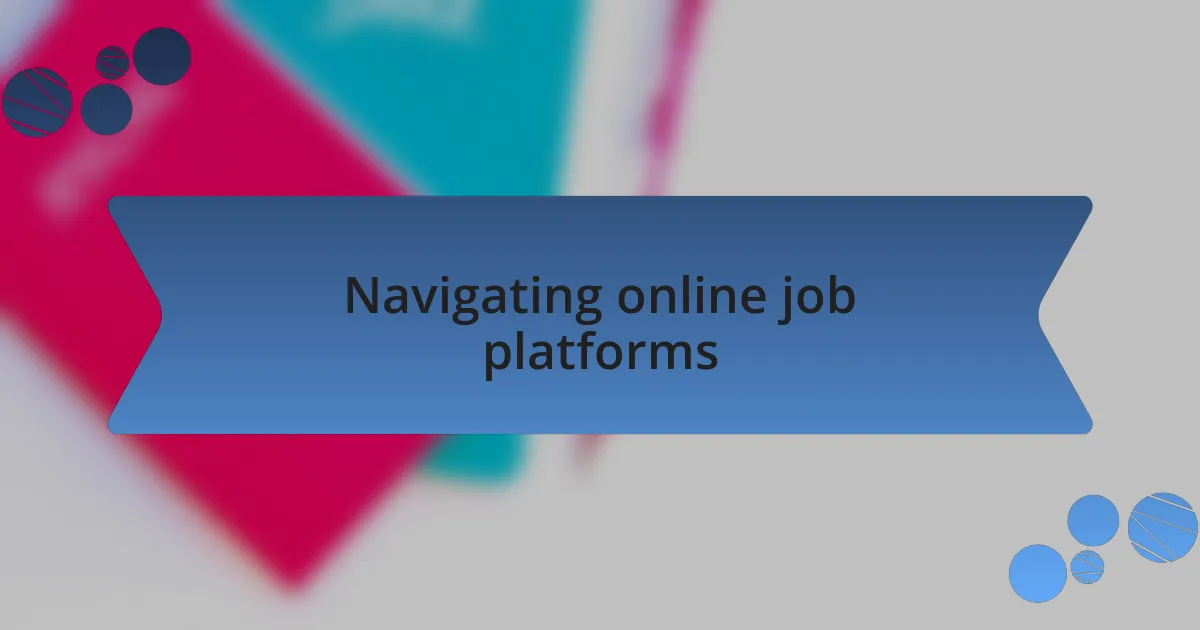
Navigating online job platforms
Navigating online job platforms can feel a bit overwhelming, especially with so many options available. I remember the first time I logged into a popular site and was hit by a tidal wave of postings. It’s essential to utilize filters to narrow down the search effectively. Have you ever spent hours sifting through jobs that just didn’t fit? I certainly have, and trust me, honing in on specific keywords related to your desired position can save a lot of frustration.
The importance of networking on these platforms also cannot be overstated. I once stumbled upon a role through a contact I made by engaging in forums and groups related to my field. It made me realize that sometimes, it’s not just about applying to postings but also about connecting with professionals who can give you insights or even refer you. Have you considered reaching out to someone in your network when exploring job opportunities?
Lastly, I learned the hard way that tailoring your application directly within these platforms is vital. I vividly recall how my initial generic applications received little attention. By revising my profile and making sure my skills and experiences matched each role, my response rate increased significantly. It’s a reminder that even in the digital world, personalization remains key—what steps can you take to enhance your visibility and appeal?
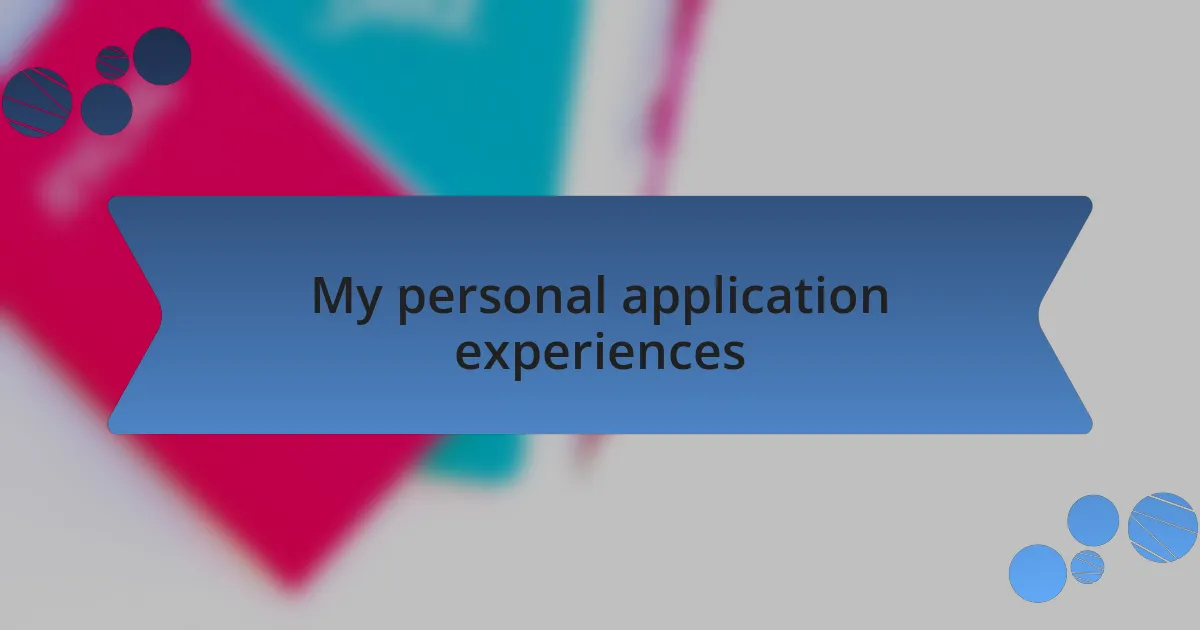
My personal application experiences
Throughout my application journey, I encountered bumps along the way that taught me invaluable lessons. I remember submitting my first application, a well-crafted resume that I believed was perfect. However, I felt a sense of disappointment wash over me when I didn’t even get a response. That experience pushed me to delve deeper into what hiring managers truly look for. Have you ever felt like your hard work went unnoticed?
As I progressed, I started attending virtual career fairs and workshops, which transformed my approach. One particular event left a lasting impression—a panel of STEM professionals shared their personal stories and challenges encountered during their own job searches. Listening to their candid anecdotes made me feel less isolated in my struggles. It’s incredible how much connecting with others can inspire and motivate you, don’t you think?
Eventually, I learned to embrace feedback. After one application received constructive criticism, I hesitated but ultimately decided to take it seriously. Revising my cover letter based on that feedback was daunting, yet it became a turning point. Seeing my efforts recognized in subsequent interviews was exhilarating. How often do we overlook the potential for growth in constructive feedback?
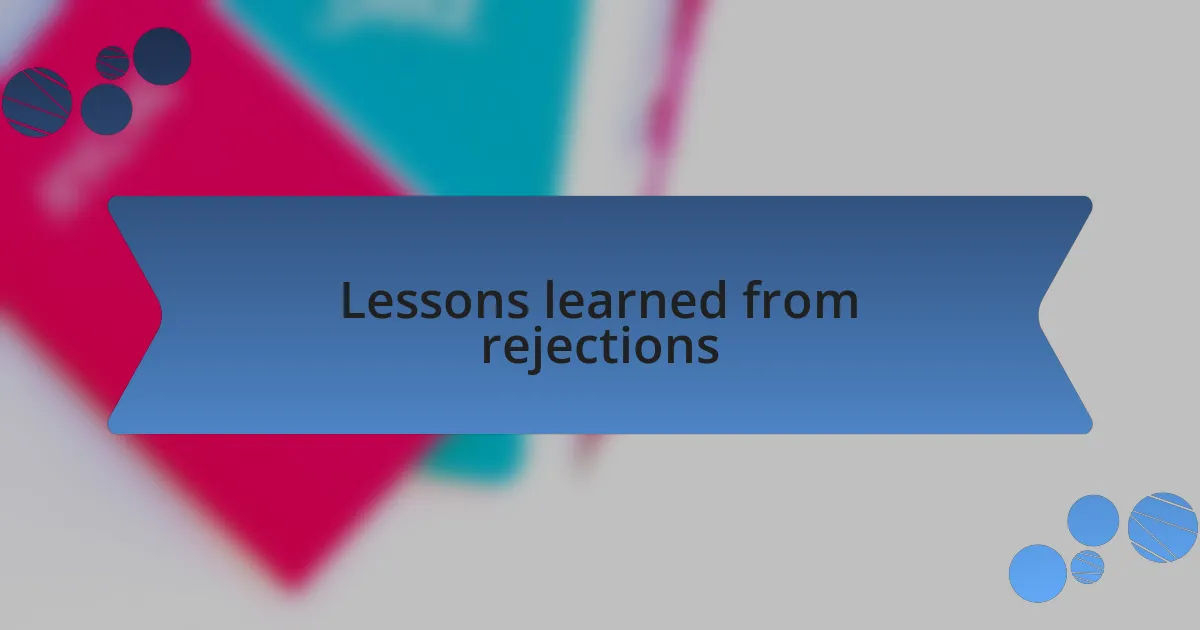
Lessons learned from rejections
Rejections are tough, no doubt about it. I vividly remember a time when I received a polite email stating that my application was unsuccessful. At first, it stung—it felt like my efforts were dismissed. But as I reflected on it, I realized a crucial lesson: each rejection serves as a stepping stone to improvement. Have you found that sometimes a setback can lead to the most significant growth in your journey?
One particular experience stands out. After being turned down for a summer internship, I decided to request feedback directly from the employer. Their insights highlighted areas I could improve, particularly in showcasing my technical skills. That rejection turned into an opportunity to refine my abilities. Isn’t it empowering to know that failures can open new doors if we’re willing to ask for help?
As I navigated through more applications, I learned to view rejections not as personal failures but as redirection. It became clear that every “no” brought me one step closer to the right fit. I started to focus on what I could control, like strengthening my network and honing my skill set. Has there been a moment in your career when a rejection pushed you towards a more fulfilling path? I believe it’s in those moments that we truly discover our resilience.